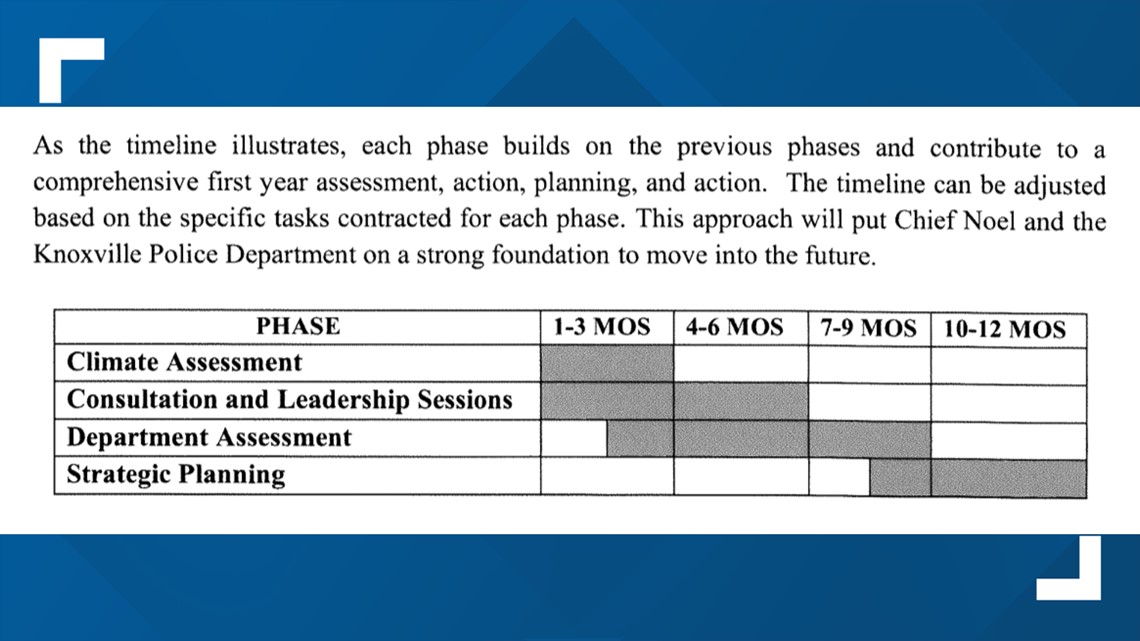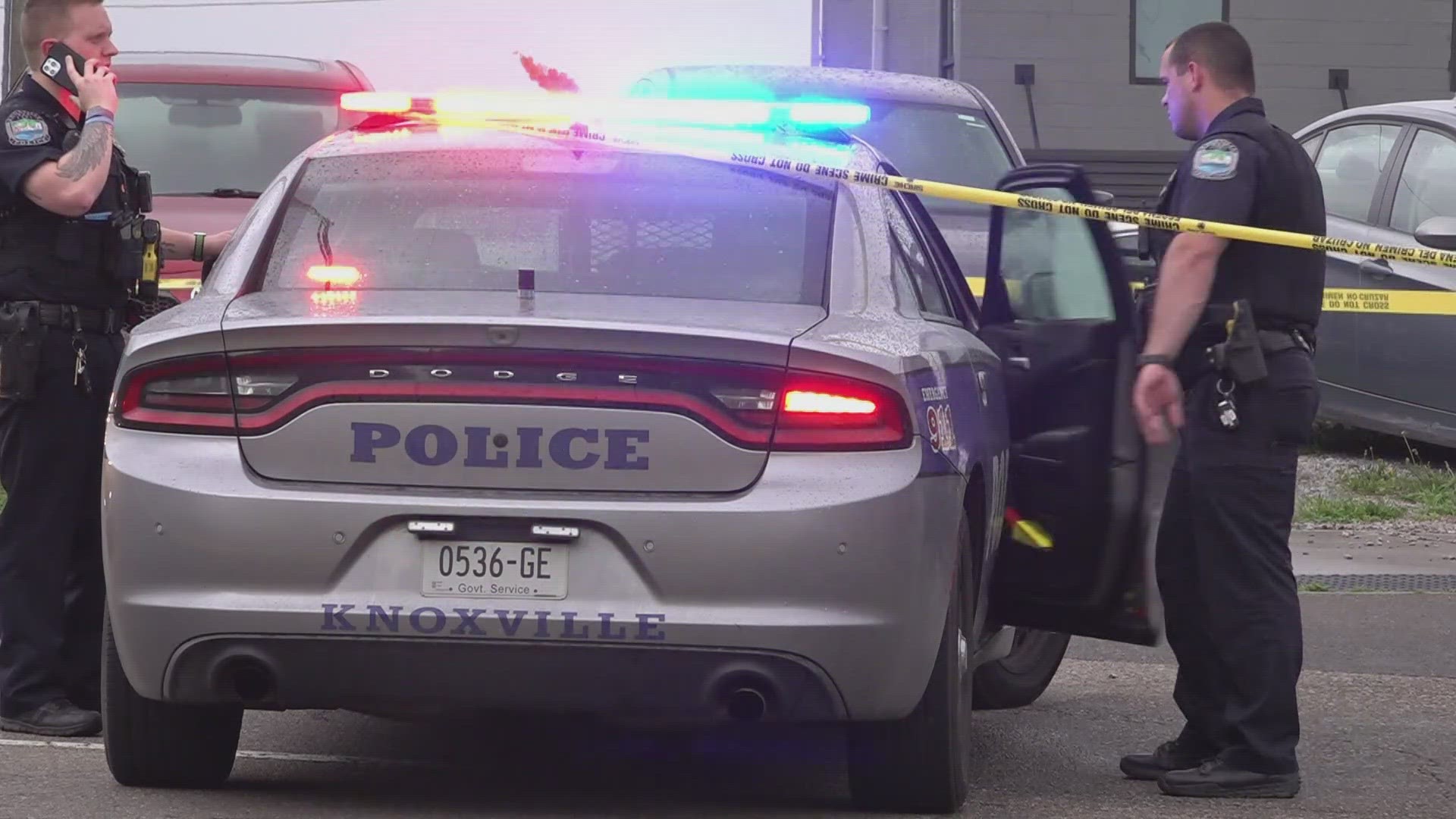KNOXVILLE, Tenn. — A process meant to improve the Knoxville Police Department and its relationship with the community took its next step on Tuesday when 21CP Solutions released its final report from a departmental assessment.
The report included dozens of recommended changes and came after a climate assessment report was released in October 2022. That report highlighted KPD's need to improve its promotion process, technology and diversity. The most recent departmental report focused on seven specific areas, listed below.
- Use of force
- Impartial policing
- Vehicle pursuits
- Response to vulnerable individuals
- Staffing and deployment
- Training
- Stops, searches and arrests
Knoxville City Council agreed in June 2022 to use a $40,250 donation in June 2022 to hire 21CP solutions to conduct the assessments and make recommendations. Chief Paul Noel called for improving the culture of the police department and building trust with the community as he started in the role.
There are four phases in 21CP Solution's work, and the new report ends the third phase. More information about the recommendations, per category, in the departmental assessment is available below.


Use of Force
The report said KPD's existing policy on how officers use force addresses many requirements and performance expectations for officers, and 21CP Solutions said it emphasizes the importance of human life. It also only allows officers to use force when "no reasonably effective alternative appears to exist."
"The current policy adheres to many of the core principles surrounding force that 21CP would expect to see in a modern force policy. At the same time, 21CP identified several ways that the Department can enhance its current policy to provide officers with more specific, operational guidance on when force may and may not be used," the report said.
The report recommends that KPD get rid of some of the language in its policies that suggest using force is routine. The report specifically noted officers received 277,305 calls for service in 2021 and only engaged in 140 "documentable force incidents," resulting in force involved in 0.05% of all interactions.
It recommended rewriting its policies to show that "members of this department may be confronted with situations where using force may be necessary to address the threat of harm to members of the public or officers, effect an arrest, take someone into protective custody, defend oneself, and to protect the public’s safety.”
It also suggested that the department build on existing language to emphasize that force can only be used when there is absolutely no other option, and said force should only be used when it's proportional to the threat that a person poses. The report said there is almost no discussion of proportionality in the current policy.
To help officers, the report suggested KPD outline a "Critical Decision-Making Model" emphasizing officers continually assess critical incidents and strategically use time, distance, cover and de-escalation during incidents. The model would replace the current "Use of Force Continuum" model that KPD currently uses.
Policies should also more directly show officers that de-escalation is "an affirmative duty" whenever feasible and across all incidents, and de-escalation can encompass an array of tactics beyond verbal skills or communication strategies, the report said.
It also recommended specifically prohibiting some types of force that "are almost never objectively reasonable, necessary, or proportional." Those types of force are listed below.
- Techniques and/or modes of transport that run a substantial risk of positional asphyxia.
- Use of force to subdue a person who is not suspected of any criminal conduct.
- Use of force against individuals who are solely engaged in exercising their First Amendment rights and/or only verbally confront officers.
- Use of retaliatory force.
- Use of force against persons who are handcuffed or otherwise restrained.
- Use of force to overcome only passive resistance.
- Use of head strikes with hard objects unless deadly force is authorized under the circumstances.
Stops, Searches, and Arrests
The report said KPD does not have "sufficiently detailed policy guidance" on when and how officers can conduct stops and when searches of people, vehicles and homes may be warranted. It said cursory guidance on search is available in its "Bias Based Policing" policies, but the report said it did not fully address the complexity of laws surrounding search and seizure.
So, it recommended that KPD expand its policy to provide more specific background information and guidance on topics like the difference between voluntary and involuntary contact, the difference between probable cause and an investigative stop, and requirements for stops to be limited to a reasonable amount of time under the circumstances.
It also said KPD should require officers to document involuntary interactions with the public. The specific information it recommended be documented is available below.
- The location of the investigatory stop or encounter
- The race, ethnicity, gender, and age of the subject
- A specific, free-response description of the legal justification for the stop or encounter (such as the reasonable articulable suspicion necessary to justify a Terry stop)
- The duration of the stop or encounter
- Whether a frisk or other search was conducted; the type of search conducted (e.g., consent, probable cause, search incident to arrest, etc.); and what, if anything, was discovered pursuant to the search
- The outcome of the interaction (such as an arrest, citation, warning, or the interaction concluding without any specific action or activity).
Impartial Policing
By improving policies about impartial policing, the report hoped to address "implicit or subconscious bias" which could lead to unfair outcomes or treatment.
"Police departments occupy a singular place in helping to consider and implement solutions that might address and affect unfair treatment and outcomes. Indeed, whether conscious or unconscious, or intentional or unintentional, when it comes to policing, both the perception and reality that the burdens of law enforcement are distributed unequally based on race undermines the sense of fairness, justice, and legitimacy that are bedrock democratic principals," the report said.
It recommended that KPD work to ensure all relevant policies and training share a commitment to procedural justice. It defined "procedural justice" as a commitment to being fair in processes, being transparent in actions, providing opportunities for people to share their voice and being impartial in decision-making processes.
It also recommended the department require regular and independent analysis of both officer data and the department's overall performance to discern if any specific activity, program or approach is having a disproportionate impact on one community compared to another.
The report also specifically recommended making information about civilian complaints available on its website. It recommended that KPD also work with the Knoxville community to design training on the histories of the city's communities, along with training on cross-cultural competency and decision-making strategies.
Vehicle Pursuits
The report said KPD officers were in 54 pursuits in 2021, and most were short with around two-thirds lasting less than 2 minutes. However, KPD also said most happened at a high speed — mostly between 81 mph and 90 mph. Around half the time, those pursuits ended with a suspect in handcuffs, the report said. Most of the time, charges following a pursuit included evading arrest charges with gun, drug, theft, DUI or warrant charges as well.
"It does not appear from KPD data that a large number of apprehended pursuit subjects are charged for offenses that correspond to the subject having posed a threat of forcible, imminent physical harm prior to the pursuit," the report said.
It said officers usually decide to pursue someone around once a week and recommended KPD define what constitutes a pursuit more clearly in its policy. It also recommended expanding the list of factors officers and supervisors need to consider before choosing to pursue someone, such as whether suspects can access a weapon or whether the identity of a suspect is already known.
It also recommended guaranteeing no officers would be disciplined or face negative consequences for not starting a pursuit.
Response to Vulnerable Individuals
The report specifically recommended that KPD work with stakeholders to fully fund and staff its co-response program. This program pairs officers with mental health workers to respond to calls regarding people in crisis. The report said officers were "almost uniformly positive" about the program.
Interviews about the program led to several personnel lamenting the state of mental health care in the city.
"Inside the system, it feels like the mental health facilities are tired and cannot serve a lot of people. The system is broken," said one person.
By fully funding the program, the report said KPD would be able to more thoroughly address mental health needs and be a part of long-term, community-wide changes. It also recommended that KPD implement a more formal and comprehensive Crisis Intervention Team to complement the co-response model, while also providing more crisis-intervention training for all officers.
Since dispatchers play a key role in identifying mental health-related calls, the report also recommended working with stakeholders to make sure dispatchers get ongoing training on behavioral health and crisis intervention.
It also recommended KPD play a larger role in working with social service providers, advocates and government agencies to develop training on interacting with unhoused people. It also recommended KPD work with those groups to create a "sustainable response model" to address the unique needs of unhoused people.
"Many KPD officers who talked to 21CP cited interactions with unhoused individuals as regular parts of a typical patrol day. Several officers expressed frustration at the ongoing, cyclical nature of those interactions and interventions – and a desire to have KPD at the fore in promoting solutions and social services that might realize better, more humane outcomes," the report said.
Staffing and Deployment
The report said KPD personnel expressed frustration with the existing 12-hour shift schedule, and said it left them exhausted. It led to a divorce for one officer, according to the report. The report said the 12-hour shifts were implemented as part of issues the department faced in the summer of 2020, during the COVID-19 pandemic.
KPD said there is a lack of patrol personnel, and so they could not reduce the shifts to ten hours. To find more staff, the report recommended KPD work with EMS providers and Knoxville to address long ambulance wait times, allowing ambulances to respond to more calls and clearing resources for KPD.
It also recommended KPD consider expanding how engaged non-sworn personnel can work with the department.
Training
The report recommended moving away from classroom-based instruction focused on technical skills and legal principles. It said most modern training is built "on a foundation of adult learning theory which, among other things, recognizes that training is most effective when adult students are motivated to learn, are treated as equal partners in the learning process, and can connect the instruction to their experiences."
It said KPD should emphasize real-world decision-making skills and use a diversity of adult learning techniques in its training. It should also develop and implement a strategic training plan for all officers, according to the report, and update the plan at least annually.
It also recommended KPD find ways to diversify instructors, such as by using subject matter experts who are not law enforcement officers and by making sure instructor backgrounds are varied.

